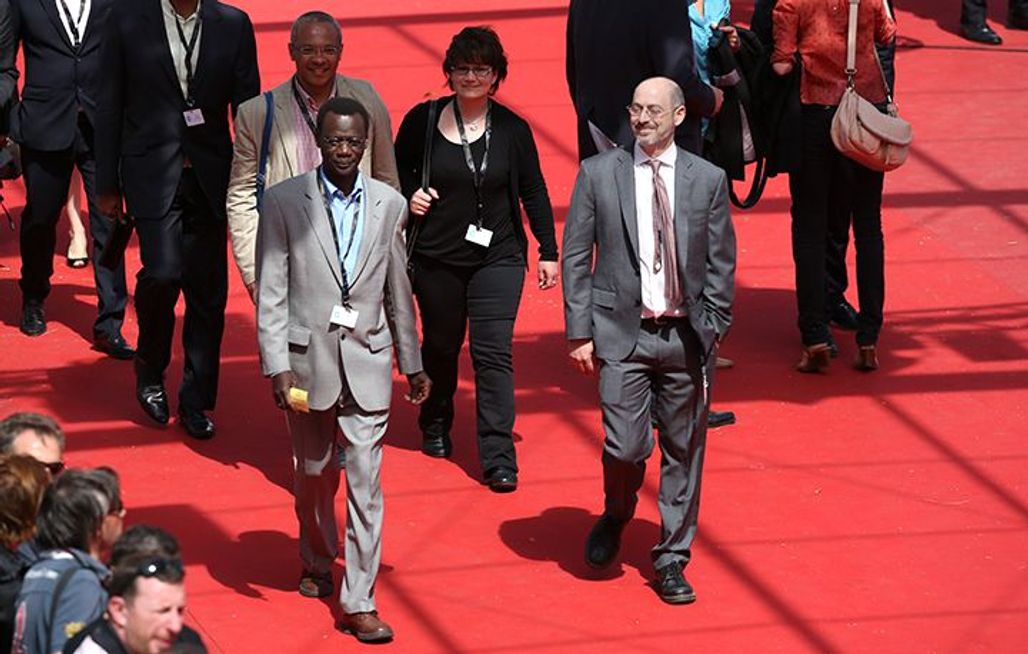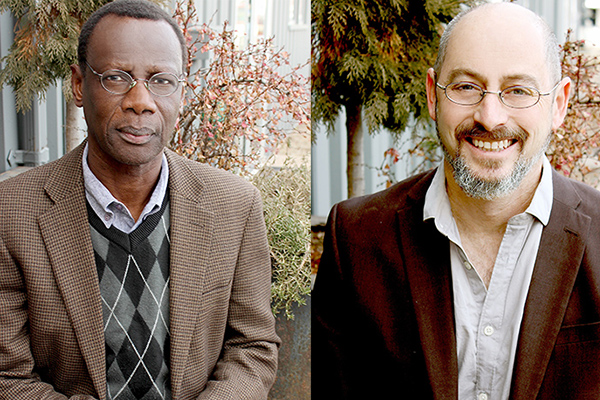
CANNES CLASSICS – Jason Silverman: “Sembene gives a voice to voiceless Africans”

“Ousmane Sembène, or a life of sacrifice in the cause of creativity.” It was these words, spoken by his co-director, that really got to Jason Silverman, who now presents Sembene! at Cannes. Together with Samba Gadjigo, they retrace the outstanding trajectory of this forefather of African cinema who became a self-taught film director at the age de 40. An interview with Jason Silverman during his journey to Cannes.
Jason Silverman & Samba Gadjigo © RR
Why did you want to dedicate a film to Ousmane Sembene?
Samba’s stories about Sembene amazed me. I’ve always admired artists who go beyond the usual limits to do their work. Sembene demonstrated a level of dedication that was new to me, making films against the longest of odds, inventing his own systems. And he did it for more than 40 years. That story is in itself dramatic enough to justify a biography. But there’s more: Sembene’s work is incredibly unified, perhaps more so than any major 20th century artist. He followed one mission: to give a voice to voiceless Africans. He was motivated, over the course of 50 years, to tell the stories that would galvanize and liberate Africans. That, too is fascinating, and that passion and focus animates his work and makes it feel totally distinctive. And there is still more: Sembene’s films are amazing. I taught film history at a Native American university for artists, and Sembene’s films were by far the students’ favorites. That proved to me that, despite the supposed distance between West Africa and indigenous North America, and between the cinematic aesthetics of the 1960s and 1970s and those of today, Sembene’s films remain universally powerful. They speak especially strongly to audiences who feel marginalized by the cynical, profit-driven cultural machinery that dominates modern discourse.
How did you work on your film? What kind of documents did you use?
The film is a deeply personal one, as we tell Samba’s story of first finding Sembene’s work, and then going on a journey to find the man himself. At the same time, it is a fairly ambitious historical epic, covering more than 80 years of complex history, with a complicated man at its center. Our challenge was to find the balance between those strands. We went through many versions before we were able to weave the different strands in a way that felt to us to be emotional and dramatic. We gathered wonderful material, starting with Samba’s own archive, including footage he shot during the 17 years he worked with Sembene, hundreds of photos and Samba’s own writings. Thanks to the partnership with the Sembene estate and Alain Sembene, we had access to Sembene’s films and novels, which are simply incredible. We spent two years uncovering archive material from the different eras and places that defined Sembene—colonial West Africa, post-war Marseilles, modern Senegal—and we did rounds of interviews with the people who knew Sembene best. During all of this, Samba and I did about 80 hours of interviews together, so I could better understand his story and the contexts. We then went through an elaborate process of selecting key footage and building subject-based selections, a total of 70 of them. That narrowed our footage from about 220 hours to a more workable 40 or so.
Do you have an anecdote to share?
One trip I’ll never forget is Samba and I taking a generator, a movie screen and a projector to remote villages in West Africa to show Sembene’s work, about a year after Sembene’s death. We didn’t know what to expect. Would anyone show up? And if so, what would be the response from these viewers, who were Sembene’s target audience, yet most of whom had never seen a movie? Were the films too obscure or arty? When we arrived the first day, they offered us a welcome feast and a ceremonial performance, in itself a complete surprise. Still more incredibly, at the screening that evening, the room was packed, and the audience was completely rapt. The conversation afterwards (we brought members of the cast and crew from Sembene’s films) was richer and more nuanced and moving than any film discussion I’ve ever attended. At that moment, we knew that Sembene was right. We knew Sembene did the right thing (despite the human wreckage he sometimes left in his path) by dedicating his life to telling African stories for Africans. Those who were given the opportunity to see the work (and it is a painfully small number, all told) would be moved. Their minds would be opened. They would, at least in some small way, be empowered. And that’s the mission Sembene set for himself.
Interview by Tarik Khaldi
SCREENING
Friday 15 May / Buñuel Theatre / 5.15pm



